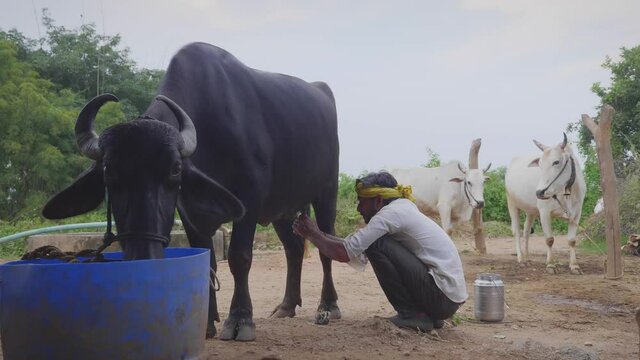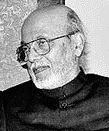
The Money Lender and the Buffalo
By Professor Nazeer Ahmed
Concord, CA

Not long ago, in a village named Ribanagar in a distant land, there lived a money lender. People called him Behra Sait, or Boda Sait in the local dialect, which meant this man had no ears. It was not that he was deaf, it was that his heart was dead.
Boda Sait occupied a brick house in the center of the village which was a patchwork of thatched huts built of mud walls and covered with coconut leaves. The windows to the moneylender’s house were always shut. There was no light inside and no fresh air; it was a veritable tomb. No one visited his home. He had no friends, sand no one invited him to their weddings or feasts. Boda Sait seldom ventured out of his dungeon, and when he did, it was only to extract riba from some poor man or the other.
Every man in town was in debt to this money lender. The sowing season for the spring crop was the prime time for brisk activity for his vile business. The farmers needed money for seeds and Boda Sait was too happy to provide them with cash. The interest rate was one anna per rupee per week which translated to three hundred and twenty five percent per year compounded each year. Once a man got a loan from this wretched moneylender, he could not extricate himself from the debt. More than half the income of the town and most of its produce went to the moneylender at the end of the harvest season.
Boda Sait controlled the town through his henchmen. The chowkidar (policeman), the Patel (tax collector) and the Shan Bhog (land record keeper) were all on his payroll. If any farmer got out of line or refused to pay the riba, the Sait sent his henchmen to beat him up or worse. Fear ruled the land and his sway went unchallenged.
There lived on the outskirts of the town a pious man, Hilmuddin Baba with his wife and four children. Baba owned a Buffalo which was his sole means of subsistence. His morning chores were routine, almost scripted. He got up from his straw mattress at the first cry of the rooster, did his wudu, performed his prayers and did his dhikr until daybreak. Then he stepped out of his hut with two clay pots, a large pitcher filled with water, and a small jug with a handle, shaped like a kettle. He would approach his buffalo with love and respect, wash its udders and start the milking process, always remembering to say Bismillah first.
It was a beautiful spring morning that fateful day. Specks of clouds in the sky received the first rays of the sun and showed off their variegated colors in manifest splendor. The sparrows arrived in flocks, chirping in unison on the papaya trees. The myna bird sat high up on the banyan tree and kept up an uninterrupted song of coo, coo, coo.
The udders of the buffalo were full, all four of them. Baba squatted in front of the hind legs of his buffalo and recited aloud Bismillah ir Rahman ir Rahim (In the Name of God, Most Gracious, Most Merciful). He carefully washed the udders. Then, he applied firm pressure with his thumb, index finger and the palm of his hand, squeezing the first udder. Milk squirted out of the udder as if from a pressurized container. “Inshallah, I will collect at least two seyrs (one gallon) of milk today”. Baba thought. “It will be enough to sustain my family for one whole day”.
Baba continued to milk, one udder and then the next. The rizq from the heavens descended upon the udders as if each udder was a perennial fountain gushing forth divine providence. As Baba finished with one udder the other would be full of milk. After each round of milking, Baba carefully emptied the small jug into the large clay container, until it was almost full.
There was a tea stall in the village. It served as a social center and gossip center for the men before they went off to the fields to work. Baba placed the pitcher on his shoulder, walked to the tea stall and for a gallon of milk, received one rupee as payment.
Baba had inherited a debt from his father. It was said that his father had borrowed fifty rupees from Boda Sait to buy seed for his acre of land many years ago. The land had long since been sold but the debt remained. Nothing was written down; the transaction was all verbal. No one knew whether the initial loan was fifty rupees or less but nobody dared challenge the word of the money lender.
The payment on this inherited debt was eight annas (half a rupee) per day. The agents of the moneylender were always there at the tea stall to collect the money from each man as he visited the stall for his morning cup of tea.
Baba was aware of the injunction in the Qur’an, “Those who consume usury shall not stand except as one who has lost his senses by the touch of Satan”. But he was helpless, like every other man in town. The debt was inherited, sometimes passed on from one generation to the next. He knew not how much he owed or how much was paid. The daily payment of half a rupee had become a routine.
That day, the agent of Boda Sait was not at the tea stall. This was most unusual. Baba did not trust the money lender. “This must be a ruse”, Baba thought. Inshallah, I will face it and overcome it.
On his way home, Baba stopped off at the chowk, the outdoor marketplace, and bought rice, ragi, carrots, beans and vegetables, enough ration for the day, spending the entire rupee in a fit of elation. Arriving at his hut, he emptied his bag with all he had bought before his wife. “Let us have a feast today”, he said to his wife. “The agent of the Boda Sait was not at the tea stall. I spent the entire rupee on our rations”.
Baba sat down on the floor of his hut. It was a clean floor, plastered with red clay, washed with a wet cloth every morning. A shaft of the morning sun came into the hut from a round role in a side wall of the hut which served as a window. He closed his eyes, and thanked divine mercy for the sustenance of the day.
No sooner had he closed his eyes than the peace of the morning was shattered by a big bang and the whack of a cudgel. Baba rushed out. There was Boda Sait in front of his hut with four of his henchmen. They had untied the buffalo from its peg. One of the men was beating the poor animal with his cudgel.
Baba was aghast. “Why are you beating the buffalo?” he protested.
“You have not paid your dues”, said the cruel Sait. “You owe me fifty rupees and until you pay that amount I will keep the buffalo with me.”
“Please, sir”, Baba pleaded, “It is the sole source of sustenance for my children. Show some compassion. I will make my payments on time”. But the Sait had no ears. His heart was sealed. He did not hear.
The men took the buffalo, and as they walked away, continued to whack the buffalo. As they turned the corner, the buffalo let go of a loud wailing, umbaaaa… and looked around, as if to say goodbye to Baba who stood transfixed in front of his hut. There were tears in the eyes of the buffalo and a viscous cuff oozed out of its mouth. The buffalo wept for man but man was constrained by custom not to cry. Who says that animals do not have emotions? Their emotions are a reflection of that which is within the human breast and they bear witness on the canvas of creation to the trusteeship that was accepted by humankind.
Baba searched his heart deep that afternoon and all evening. “What Allah wills, happens”, he thought “Allahu khairur Razikeehn (Allah is the best of providers). Surely, he will provide for my children”.
The following morning, Hilmuddin Baba packed up his few belongings and migrated with his family to Big Town. There, he met a Shaikh, and with his help, set up a small fruit stall. The trade grew, blessed by divine providence. The stall grew into a shop and then into a mandi (a wholesale transaction house). The angels guided his trade and he became a rich man.
Many years went by. Now an elderly man with a glistening, white beard, Baba returned to his village to look up his old friends. The village had been transformed. Where stood thatched huts at one time, there were now solid brick homes. The house of Boda Sait was gone and in its place there was a park and a playground for children. The tea stall had disappeared and a hotel occupied that space. As he walked along the main street, Baba recognized an old acquaintance and stopped to inquire about the town.
“The buffalo and the Sait both died soon after you left”, said the acquaintance, “People said it was the curse of God”, he continued. “After the evil man died, the darkness that shrouded the town lifted. There was good rainfall, the trees grew taller, and the fields yielded abundant crops. The government built a brick factory nearby and everyone had work. The land flourished. There was even a school for our children and some of them went on to study in Big Town. The panchayat (village council) changed the name of the village. Now it is called Abadnagar.”
“Allahu khairr Raziqeen”, Hilmuddin Baba heard the echo in his heart, “He gives to whom He pleases and when He gives, there is no limit”. He retraced his steps, got back into his carriage, and headed home.
(The author is Director, World Organization for Resource Development and Education, Washington, DC; Director, American Institute of Islamic History and Culture, CA; Member, State Knowledge Commission, Bangalore; and Chairman, Delixus Group)

